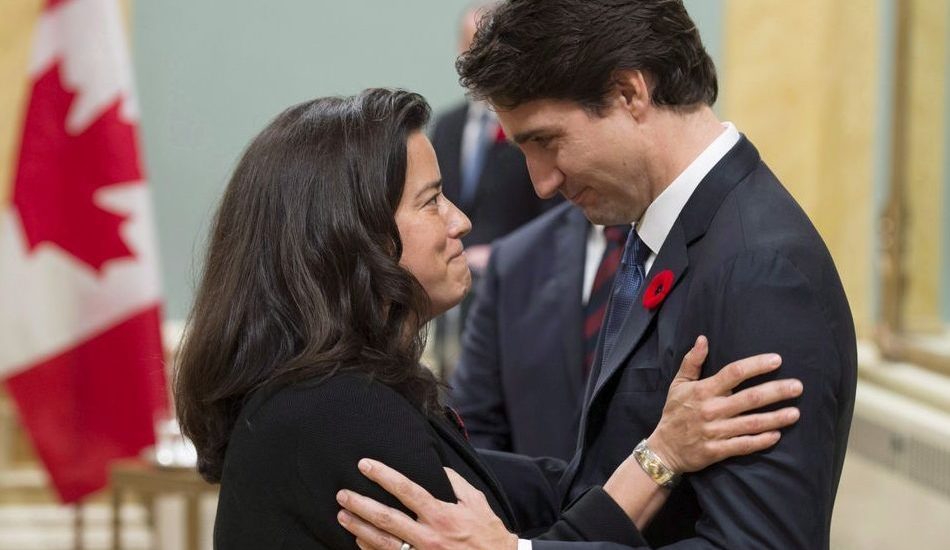
KJIPUKTUK (Halifax) – In early 2019, the SNC Lavalin scandal captivated Canada’s national media and pundits. The news broke in February that Jody Wilson-Raybould’s refusal to interfere in a criminal case against SNC Lavalin likely led to her removal from the justice portfolio.
Wilson-Raybould resigned from cabinet later that month, followed by former Treasury Board President Jane Philpott in early March. The loss of two high-profile women from Justin Trudeau’s gender-parity cabinet suggests that though the Prime Minister may talk the talk when it comes to feminism, he consistently fails to walk the walk.
After all, this isn’t the first time Trudeau has been accused of failing to live up to his stated feminist values. In 2016, then-Minister of Democratic Institutions Maryam Monsef was tasked with fulfilling the Liberal Party’s campaign promise of electoral reform. Opposition parties cried foul at the Liberal majority on the Special Committee on Electoral Reform—evidence, they said, that the Trudeau government wasn’t serious about ending first-past-the-post.
Although Monesf added more opposition MPs to the committee, the Liberal government refused to adopt its report. The opposition then accused Trudeau of using a racialized woman minister to do his government’s dirty work—sabotaging its own campaign promise. The Liberals even had Karina Gould—Monsef’s successor and another rookie woman MP—announce the government’s intention to abandon electoral reform.
Just as Trudeau used Maryam Monsef and Karina Gould to deliver the bad news of his decision to abandon electoral reform, Nova Scotia Premier Stephen McNeil has repeatedly used female cabinet ministers—notably former finance minister Diana Whalen and former education minister Karen Casey—as the public face of his government’s most unpopular decisions. And while McNeil doesn’t echo Trudeau’s feminist grandstanding, his government has repeatedly failed to deliver policies that would improve the lives of women in Nova Scotia.
Like his federal counterpart, McNeil has refused to develop anything resembling a universal child care system. In its place, the Liberals have given Nova Scotians a piecemeal pre-primary program; four days of unpaid leave for domestic violence survivors; and provincial Income Assistance rates that will push single mothers on IA even further below the poverty line, relative to inflation.
It would be tempting to assume that this brand of political hypocrisy is a problem confined to particular politicians or a particular political party. It is not. In the case of Nova Scotia, long-standing underfunding by successive governments has contributed to a service crisis for victims of intimate partner violence; its most recent symptom is the Avalon Sexual Assault Centre’s announcement that they are freezing their counselling waitlists.
Whatever you think about the SNC Lavalin scandal, or the McNeil Government’s failure to recognize the needs of sexual assault survivors, the Liberals’ hypocrisy around feminism and anti-racism isn’t simply Trudeau’s mistake, or McNeil’s, or the Grits’. Political hypocrisy—an intractable tension between stated values and political reality—is baked into the guiding philosophy of Canada’s political culture. The Trudeau government’s treatment of women MPs is just one of the latest, most high-profile manifestations of this tension.
Canada, and Nova Scotia, are liberal democracies. Conservatives (and likely many New Democrats and Greens) might balk at that statement, but Canada’s system of government is rooted in the traditional liberal philosophy of nineteenth Century Europe that its founders ascribed to. Small-l liberalism sanctifies individual rights (including property rights but not community rights); representative democracy; and a free-market economy.
Likewise, these principles are the cornerstones of Canada’s political and legal systems. Our major political parties might argue about how high or low certain taxes should be, or whether the government should fund a particular social program (and these things do have a very real impact on people’s lives), but none of them are seeking to fundamentally change how Canadian society is organized.
So, what does this have to do with feminism? Liberalism is, at its core, concerned with individual rights, and not the collective rights of oppressed peoples or communities. Liberalism has little problem championing particular individuals from oppressed groups (such as women, Indigenous nations, racialized communities, or LGBTQ people). Liberalism’s intractable political tension appears when whole groups of oppressed people demand justice. Tackling systemic oppression requires the redistribution of material wealth and resources, but large-scale redistribution violates the liberal sanctity of private property and wealth accumulation.
This contradiction creates a problem for proponents of liberalism. On the one hand, their support of equal rights for all individuals prompts them to uphold the rights of individual women. But on the other hand, they are curiously silent when it comes to the significant structural changes that would produce real equality for all women. The Trudeau government pats itself on the back for having gender parity in cabinet, but refuses, for instance, to implement universal childcare.
Liberal individualism has its limits, of course; when necessary, it takes a back seat to other aspects of the liberal status quo. While proponents of liberalism might describe personal freedom as their guiding principle, the capitalist free market is the prime mover in today’s liberal democracies. Why else would the Trudeau government throw its support behind fossil fuel pipelines, while ignoring widespread, women-led Indigenous resistance, not to mention our need to transition to a low-carbon economy?
The Liberals’ approach to feminism isn’t a bug, it’s a feature. Putting individual rights ahead of community rights—and capitalist imperatives ahead of both—keeps the hierarchies of the status quo intact. And this is just as true with feminism as it is with Indigenous rights, workers’ rights, or the fight against poverty.
Our problem is not the moral character of Justin Trudeau, Stephen McNeil, or any other public figure. Rather, we are beholden to a worldview and political system that only sees people as individuals with identical (yet individual) interests, and not as members of communities with diverse histories, experiences, and material interests. Liberalism will not end systemic oppression or save us from crises such as climate change. These problems require more than just a tweaking of the status quo; they require a wholesale reorganization of society.
With a special thanks to our generous donors who make publication of the Nova Scotia Advocate possible.
Subscribe to the Nova Scotia Advocate weekly digest and never miss an article again. It’s free!



